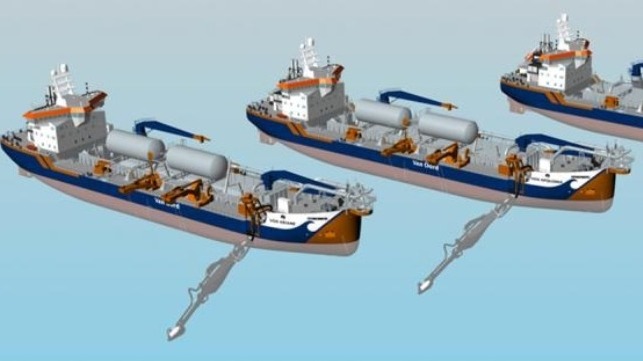 Van Oord’s future LNG-fueled dredgers (image courtesy Van Oord)
Van Oord’s future LNG-fueled dredgers (image courtesy Van Oord)
By The Maritime Executive 06-01-2020 03:17:04
Dutch dredging company Van Oord has secured a green loan for the construction of three new LNG-fueled trailing suction hopper dredges (TSHDs) which are currently under construction at Singaporean yard Keppel FELS.
The company’s first green loans under the new financing structure were signed with BNP Paribas and Rabobank last week. They conform to the Loan Market Association’s standard Green Loan Principles 2020, which underpin sustainable economic activity. Van Oord could apply for more financing in the future based on the agreed green loan framework.
A competing green loan certification scheme, the Climate Bond Initiative (CBI), has expressed skepticism about the “green” nature of LNG-fueled vessels. In keeping with its name, the CBI requires a plan for transitioning to future bio-based / carbon-neutral fuels as part of any green certification for financing a fossil-fueled vessel, including an LNG-fueled vessel. The LMA Green Loan Principles are less prescriptive and permit projects that reduce air emissions in general – for example, reducing health-related emissions like particulate matter and SOx, an area where LNG excels.
According to Van Oord, the new dredging vessels will obtain a Green Passport and Clean Ship Notation. By using LNG, van Oord expects to reduce the emissions of its fleet.
Since the publication of the Poseidon Principles on shipping finance last June, shipowners have kept an eye on how access to capital could be conditioned upon the “green” certification of their newbuild programs. The Principles commit 18 participating financial institutions to integrating climate considerations into their lending decisions. They establish a standard baseline to assess and disclose whether financial institutions’ lending portfolios align with greenhouse gas reduction targets. Banks accounting for about one third of the world’s shipping loan portfolio have signed on to the Poseidon Principles.
The Principles acknowledge that methane emissions from shipping have increased in recent years due to methane slip and an increase in LNG carrier tonnage. Methane is a potent greenhouse gas, and while CO2 accounts for the vast majority of shipping’s climate impact, the Principles note that there is potential for methane emissions to rise further “if shipping moves to liquefied natural gas (LNG)-powered ships.” LNG marine fuel advocates assert that LNG has a positive net climate effect when compared with traditional bunker fuel, especially when considered as an enabling technology for future biofuels (biogas).
source: www.maritime-executive.com


